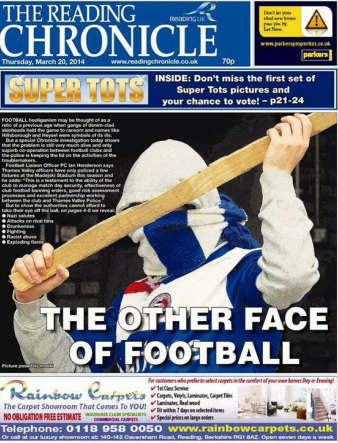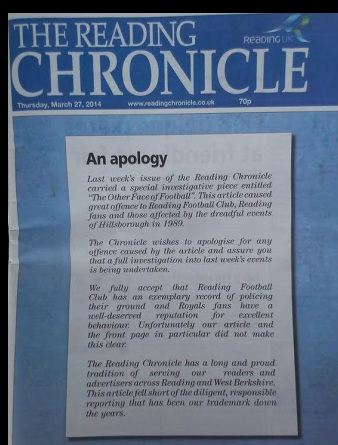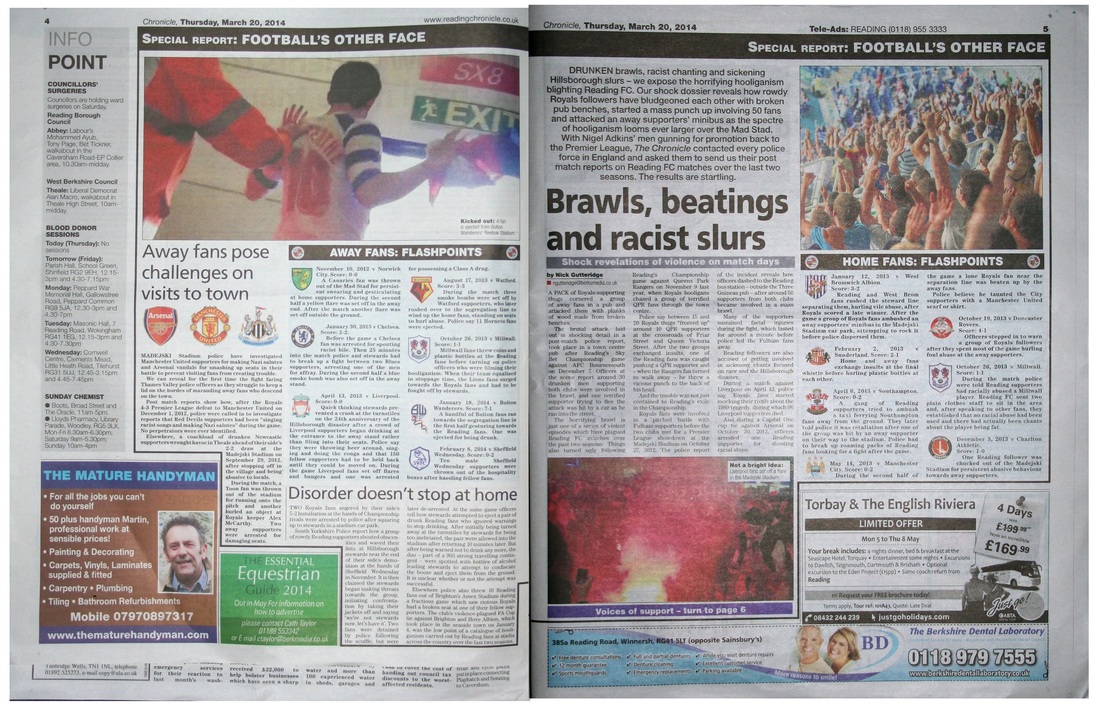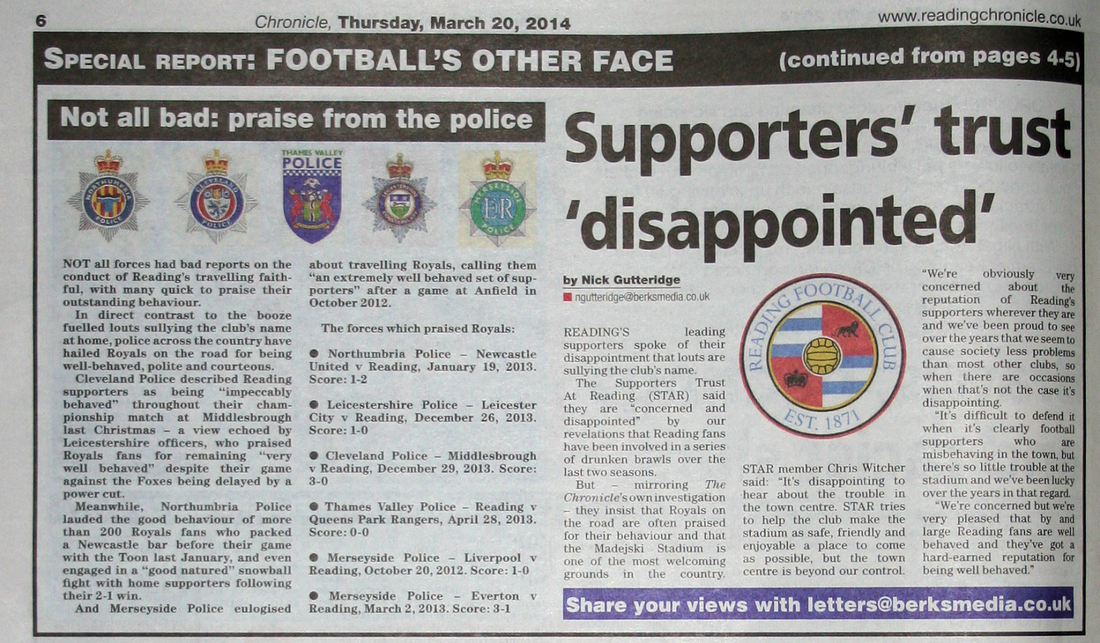Reading Chronicle and football hooliganism
Saturday 29 March, 2014
None of us likes a bollocking, especially when we've gone home confident of a job well done. We assume that the call from the boss's secretary is an invitation to a pat on the back, possibly even a pay rise or the promise of promotion. It comes as a shock to find instead black looks and a black bin liner to accommodate the contents of your desk.
So SubScribe can't help but feel sorry for Nick Gutteridge, a young reporter with only a couple of years' experience, and Maurice O'Brien, an old hand who waited 46 years to become an editor and now faces losing his chair after 62 days.
Their crime was to attempt investigative journalism in an area where there was little to investigate. This not only upset the local football club and its fans, but inflamed Hillsborough campaigners with a single careless sentence.
The whole enterprise - to show that football hooliganism was not a problem of the past, but still a smouldering issue today - was approached with an extraordinary level of naivety and incompetence.
But there must also have been a genuine motive. Something must have caused O'Brien - who describes himself on Twitter as a Manchester United obsessive - or Gutteridge, or the paper's new news editor Tessa Watkins to decide there was something worth looking into. Local newspapers don't have the resources to go round contacting every police force in the country without good reason.
A hunch, based on the rows over Anelka and Suarez? An incident mentioned in the pub or over dinner? Whatever the background, anecdotes are not evidence and clearly the reason wasn't good enough.
None of us likes a bollocking, especially when we've gone home confident of a job well done. We assume that the call from the boss's secretary is an invitation to a pat on the back, possibly even a pay rise or the promise of promotion. It comes as a shock to find instead black looks and a black bin liner to accommodate the contents of your desk.
So SubScribe can't help but feel sorry for Nick Gutteridge, a young reporter with only a couple of years' experience, and Maurice O'Brien, an old hand who waited 46 years to become an editor and now faces losing his chair after 62 days.
Their crime was to attempt investigative journalism in an area where there was little to investigate. This not only upset the local football club and its fans, but inflamed Hillsborough campaigners with a single careless sentence.
The whole enterprise - to show that football hooliganism was not a problem of the past, but still a smouldering issue today - was approached with an extraordinary level of naivety and incompetence.
But there must also have been a genuine motive. Something must have caused O'Brien - who describes himself on Twitter as a Manchester United obsessive - or Gutteridge, or the paper's new news editor Tessa Watkins to decide there was something worth looking into. Local newspapers don't have the resources to go round contacting every police force in the country without good reason.
A hunch, based on the rows over Anelka and Suarez? An incident mentioned in the pub or over dinner? Whatever the background, anecdotes are not evidence and clearly the reason wasn't good enough.
Nor was the journalism. Gutteridge gathered in the information from the police, but didn't have the experience to assess it. Important questions went unasked - like the most basic "how do these incidents compare with other clubs in other towns?"
The strong hint from the police that Reading was doing just fine was quoted on the front, but the subtext "there's no story here" went unheeded. Instead it was turned into a call for continued vigilance to keep the lid on troublemakers.
The strong hint from the police that Reading was doing just fine was quoted on the front, but the subtext "there's no story here" went unheeded. Instead it was turned into a call for continued vigilance to keep the lid on troublemakers.
|
That was the problem all along the line. The Chronicle team was so hellbent on its exposé that it disregarded warning signals everywhere, such as the number of arrests - eight in two years from an attendance of nearly half a million - the number of matches that required policing inside the ground - only a couple so far this season.
Did the news team talk to the sports department at all? And where were the quotes from the club? The supporters' club is quoted as saying that it is disappointing when it hears of trouble among fans in the town - but it emphasises over and again that Reading is known as a family friendly club and that its supporters have a reputation for being well-behaved. All of this appears in print, along with a panel on the police forces that praised Reading's "travelling faithful" for their behaviour at away matches. An effort appears to have been made to produce a balanced report. The trouble is that there was no problem to be balanced out. The most recent incident in the list of home flashpoints was last December; the "low point" a scuffle at Brighton, where a Reading fan threw a broken seat at a rival supporter.
Indeed, the seven examples of rowdy behaviour could easily have been used to create a tongue-in-cheek spread to warm the heart - as one supporter said, going to the MadStad was about as dangerous as tea and scones with Gandhi. Who could but laugh at the Millwall incident: Police were told Reading supporters had racially abused a Millwall player. Reading FC sent two plain-clothes staff to sit in the area and, after speaking to other fans, they established that no racial abuse had been used and there had actually been chants about the player being fat But, no. The Chronicle had taken the scandal route. It dressed up a model in Reading kit, put a bit of 4x2 in his hands and proceeded to beat up the language, starting with the standfirst to the first spread:
Drunken brawls, racist chanting and sickening Hillsborough slurs - we expose the horrifying hooliganism blighting Reading FC. Our shock dossier shows how rowdy Royals followers have bludgeoned each other with broken pub benches, started a mass punch-up involving 50 fans and attacked an away supporters minibus as the spectre of hooliganism looms ever larger over the Mad Stad... The body of the text is also delivered in the outraged prose of the tabloids: there's a brutal attack described in shocking detail; there's a terrified supporter fleeing; there's a horrifying brawl; hordes of marauding away fans and roaming packs of Reading fans spout racist bile. And there's a lot of hurling - vile abuse, foul abuse, plastic bottles and 'an object'.
And - heaven forfend - Liverpool supporters once danced the conga. It's clearly hyped-up nonsense, so why is everyone getting so het up, surely no one will take it seriously? But they did. The club suspended relations with the paper, the fans turned on the reporter via Twitter (see Gutteridge's timeline reproduced on the right - you have to feel sorry for the lad), the supporters' club wrote a letter of protest and at least ten complaints were made to the Press Complaints Commission. And that was just in Reading. In Liverpool there was fury at the linking of the words hooliganism and Hillsborough - and more than a few pointed out that the Chronicle should not have been making any reference to the disaster while the inquests are about to start. More formal complaints followed, including some to the Attorney-General, who is now apparently investigating whether there has been a contempt of court. The offending sentence comes right at the top of the front page in the white-on-black text introducing the special investigation: Football hooliganism may be thought of as a relic of a previous age when gangs of denim-clad skinheads held the game to ransom and names like Hillsborough and Heysel were symbols of its ills. O'Brien apologised swiftly, saying: “We certainly in no way would wish to link Hillsborough with hooliganism. That certainly wasn’t our intention. It is simply the fact at that time, when it happened, when you said to people ‘football hooligans’, people said ‘Hillsborough and Heysel’."
The publishers also apologised, and on Thursday the paper produced what people have been crying out for for years: an apology given the same prominence as the original article - the whole of the front page. Last week’s issue of the Reading Chronicle carried a special investigative piece entitled "The Other Face of Football”. Call me an old softie, but it seems so sad. A local paper trying to do "proper" journalism and coming unstuck spectacularly. The editor is suspended, the reporter is under siege, the readers are outraged, the PCC and the Attorney-General are on their case.
How much less trouble would it have been simply to have gone down the road of UGC and let the police, the council and the WI fill their pages? A reporter from the rival Slough Observer congratulated the Chronicle, tweeting: "looks great fellas. Sterling example of local journalism at its best". He then confessed that he hadn't read it, but remained supportive, saying that he was applauding the principle of local papers undertaking investigative journalism. (His own paper was meanwhile uncovering the "true extent of drug misuse in Slough town centre".) |
|
Unsurprisingly neither Gutteridge nor O'Brien has responded to requests to discuss what happened. You can't blame them. What we do know is that 64-year-old O'Brien has worked in the town since starting out in journalism in 1968. He was a trainee at the old Evening Post, spent 24 years with the Reading News Agency - which he eventually owned - and had been the Chronicle's news editor for 18 years before taking the editor's chair in January. He told Hold the Front Page:
“Since I arrived here I’ve worked for five editors and after nearly 46 years working in journalism in Reading. I thought it was about time I put some of that experience to good use.”
Gutteridge joined the Chronicle in November 2012 from the Surrey Herald, where he had worked for two months. He had previously had two months' work experience with the Daily Mail after obtaining his masters in multimedia journalism. Tessa Watkins, who succeeded O'Brien as news editor, had done work experience with the paper while still at school and has been on the staff for three years, latterly as chief reporter.
It must be difficult to knuckle down to the local beat if the Mail is your first port of call; the experience there seems to have had some influence on Gutteridge's writing style. But the basic questions of any story have to be answered, whatever the level of journalism. Youthful enthusiasm and ambition may explain a lot here - every junior reporter is on a mission to shake up the old local rag - but a man of O'Brien's experience should have seen the flaws in the project. He, too, was on a learning curve: there is more to being an editor than producing the paper and he may have been surprised by the amount of peripheral stuff he has to deal with.
This hooliganism story was a disaster. The Chronicle chose the wrong story, went about it the wrong way and finally told it the wrong way.
It was lamentable journalism. But at least it was an attempt at journalism.
Gutteridge wasn't sitting in the office retyping press releases or casting an eye over self-interested, self-published twaddle from the very authorities the paper is supposed to keep under scrutiny. He went out and tried to get a story of his own. Both he and O'Brien deserved bollockings. But they also deserve a second chance.
Because they tried.
It must be difficult to knuckle down to the local beat if the Mail is your first port of call; the experience there seems to have had some influence on Gutteridge's writing style. But the basic questions of any story have to be answered, whatever the level of journalism. Youthful enthusiasm and ambition may explain a lot here - every junior reporter is on a mission to shake up the old local rag - but a man of O'Brien's experience should have seen the flaws in the project. He, too, was on a learning curve: there is more to being an editor than producing the paper and he may have been surprised by the amount of peripheral stuff he has to deal with.
This hooliganism story was a disaster. The Chronicle chose the wrong story, went about it the wrong way and finally told it the wrong way.
It was lamentable journalism. But at least it was an attempt at journalism.
Gutteridge wasn't sitting in the office retyping press releases or casting an eye over self-interested, self-published twaddle from the very authorities the paper is supposed to keep under scrutiny. He went out and tried to get a story of his own. Both he and O'Brien deserved bollockings. But they also deserve a second chance.
Because they tried.
Please sign up here for SubScribe updates
(no spam, no more than one a week)
|
|
|








